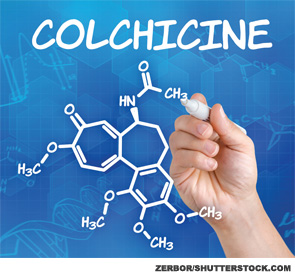Patients with acute gout and other inflammatory diseases may soon have access to less expensive colchicine therapy, thanks to a federal judge and a years-long effort by the ACR. But the fight’s not done yet.
A Jan. 9 ruling from the U.S. Court of Appeals in Delaware immediately allowed West-Ward Pharmaceutical Corp. and Hikma Pharmaceuticals Inc. to offer generic colchicine products to the market for prophylactic gout treatment. Although an appeal from the current producer, Takeda, is in progress, the ACR pledges to continue keeping a wary eye on patient and physician access to much-needed medications at more affordable prices.
Background
The current case began after West-Ward and Hikma received FDA approval in September 2014 for Mitigare, a 0.6 mg colchicine capsule for prophylactic gout treatment. Takeda Pharmaceuticals USA Inc. then filed a patent infringement suit to block Mitigare from the market. URL Pharma of Philadelphia, which was later sold to Takeda, received FDA approval for its colchicine drug, Colcrys, in 2009, along with the exclusive right to market colchicine for acute gout flares (http://www.the-rheumatologist.org/details/article/865591/Colcrys_Approval_Triggers_Questions.html). Other companies that had previously been producing colchicine for this application—Hikma among them—were ordered to stop marketing their versions of colchicine.
Since then, the price of colchicine has risen from $0.09/dose to $5/dose, a 50-fold jump.

The ACR has been battling against Colcrys as the sole treatment option since the FDA granted its approval six years ago. Before then, colchicine was already being used and was widely viewed as safe and effective. In fact, it was among the most routine treatment options for patients with gout. But URL Pharma took advantage of an FDA program to formalize approval for previously unapproved medications and became the first official purveyor of colchicine. That granted the company a three-year window of exclusivity, and the price spike followed.
URL Pharma “basically found a loophole in the system,” says former ACR President Stanley Cohen, MD, co-director of the Division of Rheumatology at Presbyterian Hospital in Dallas. “They were able to charge outrageous prices for a drug that didn’t require outrageous prices.”
The Current Battle
Takeda, which acquired URL Pharma in 2012, has fought to protect that exclusivity. In September, Hikma was granted approval to market and sell a version of colchicine, but Takeda obtained a temporary restraining order.
The ACR filed an amicus curiae brief in the case, arguing that preventing Mitigare from reaching the market was a disservice to patients.
“Gout is a condition for which there is already low medication adherence,” says rheumatologist Kenneth Saag, MD, MSc, director, Center for Education & Research on Therapeutics of Musculoskeletal Disorders (CERTS) at the University of Alabama–Birmingham in Birmingham, Ala. “Anything that creates a barrier is problematic.” He says the case is important because too many patients can’t afford expensive medication.
The case went to the court on Jan. 9, 2015, for oral arguments. Although as this issue goes to press the court has yet to release its detailed opinion, it did issue an order that same afternoon vacating the district court’s injunction, stating that West-Ward was “free to immediately offer colchicine products for prophylactic use.”
Takeda says it will continue to press its patent infringement lawsuit and will appeal a denial of its request to have FDA approval of Mitigare overturned.
“We remain confident that after a trial, Takeda will prevail,” Takeda general counsel Kenneth Greisman says in a statement on the firm’s website.
Still, rheumatologists are hailing the decision.
“To finally have competition with another group to potentially lower the price is a very, very major thing for our patients,” says Dr. Cohen. “This is a major improvement if we can get another competitor on the market.”
Spiro Gavaris, vice president of sales and marketing for West-Ward Pharmaceutical, did not say what their price point would be.
“Our goal is to provide the most aggressive discounts on generic colchicine in the market with the intent for those discounts to be passed on to adult patients in need of treatment for the prophylaxis of gout flares,” he says.
But regardless of the price, anything below Takeda’s figures is a boon to patients who either could not afford Colcrys or who chose not to use it. That “access to care” angle is one reason the ACR has fought for expanded options.
“We must be constantly vigilant to developments that limit access to medications,” says Eric Matteson, MD, chair of rheumatology for the Mayo Clinic in Rochester, Minn. “High drug costs limit patient access to critical medications, whether covered by insurers or out of pocket. This case highlights the vital importance of affordability of drugs in medical care.”
Setting a Precedent
Dr. Matteson says the ACR’s push against one company monopolizing the market “provided critical input into the current dispute, which led to the court’s decision.
“As this case highlights, whether brand name or generic, it is most important that our patients with rheumatic diseases have access to medications that are safe and effective at the lowest reasonable cost to them,” he says.
Several rheumatologists say that although the ruling in this case will likely lower costs for patients using this drug, they’re not hopeful that it means pharmaceutical firms will be less aggressive in protecting trademarks.
“Pharma has plenty of lawyers, and they’re going to out-lawyer people most of the time,” Dr. Cohen says. “This is a small victory, but it’s important.”
For its part, the ACR says in a statement that it was proud to have lobbied for “the reintroduction of competition to the colchicine market.”
“The American College of Rheumatology’s interest in this case arose out of support for patient access to safe, effective and affordable rheumatology care,” ACR President E. William St.Clair, MD, says in the statement. “We hope this will serve as a precedent for why the voice of the medical community is a vital component to judicial proceedings that have the potential to affect the public’s access to care.”
>Richard Quinn is a freelance writer in New Jersey.

